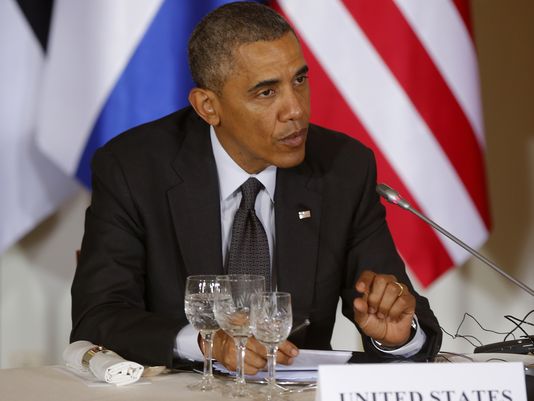The more President Obama and other heads of nations talk about preserving the international order, the more you know it is history. The question is: Can existing paradigms and institutions halt the spiral of disorder in the world, or is a completely new response required at all levels?
 The coalition President Obama is ostensibly assembling to confront the Islamic State in Syria and Iraq cannot succeed, and will make matters worse. Why?
The coalition President Obama is ostensibly assembling to confront the Islamic State in Syria and Iraq cannot succeed, and will make matters worse. Why?
Because in seeking to preserve the sacred sovereignty of nation-states, based on the ‘territorial integrity’ of Iraq and Syria (or for that matter Ukraine with regard to Russia, and the United States with regard to immigrants from the south), it will only accelerate the collapse of the old order and promote the anarchy of state and non-state actors.
The question isn’t: What will replace the hollowed out sole remaining superpower? Like all empires, it lost its potency and integrity from within, and cannot lead and forge a new order. Military power is the least important element, though most dangerously the last to go.
Nor is the question: What will replace the post-Cold War order? It was stillborn a generation ago when the US supposedly defeated the USSR, only to have a blowback with a throwback rise up. Now Russian pride calls the bluff of American arrogance.
The question is much wider and deeper than these, both politically and psychologically. What will replace the post-World War II order that the United States shaped? Indeed, what will replace the Westphalian system of nation-states?
The fact is that that history has moved beyond the nation-state as the cornerstone and foundation of political order. That’s why Obama’s core philosophical, strategic and political mistake has been couching is presidency in American national interest.
Obama had, and perhaps still has, the possibility of proposing and promoting a genuine world view, but he has consistently clung to the narrow, outdated and increasingly counterproductive paradigm of national interest. It is a monumental failure of perception and imagination.
Like most people, I would like to think humankind has more time to address the immense ecological and political challenges all peoples face. It isn’t unreasonable to hope that the world doesn’t have to go completely to hell.
But a question has seized hold of me: Is the old order is going to continue to break down at an accelerating rate? Commercial commentators are fond of pointing to Indonesia, or Mexico, or somewhere else where progress in some areas is being made. They deliberately miss the big picture.
The human crisis, which is actually a crisis of consciousness, is already acute, and it’s impossible to see things turning around without radical change at all levels. Of course, the rich, powerful and respectable cannot see this. As Upton Sinclair dryly put it, “It is difficult to get a man to understand something, when his salary depends on his not understanding it.”
It’s human nature to avoid change as long as it can be avoided, but human history indicates that when peoples’ backs are against the wall they do change. By that measure, and though it sounds strange, things have gotten so bad that may be on verge of a breakthrough.
Whether that’s the ultimate in looking for the silver lining, or an accurate perception, is difficult to discern. But optimism is Pollyannaish if it doesn’t walk far enough down the old road to see the reality pessimists see.
Sounding like the boy with a finger in a dike that’s already broken through a mile away, President Obama gave his best spin on recent world events: “The truth of the matter is that the world has always been messy. In part, we’re just noticing now because of social media and our capacity to see in intimate detail the hardships that people are going through.”
capacity to see in intimate detail the hardships that people are going through.”
There’s just enough truth in that prevalent bit of falseness to fool himself. The idea that ‘the world is as it has always been’ is meant to deflect from the truth that the world has become darker and much more with us than it has ever been.
“If you watch the nightly news,” the president said, “it feels like the world is falling apart.” Following this logic, as many people do, the solution is to not watch the nightly news.
Has the Buddhist bromide of maya, which maintains that the world is illusion, crept into President Obama’s outlook? Possibly, though Barack’s Zen-like calm certainly isn’t a product of meditation.
Only those with a roof over their heads and enough to eat, only those not living in danger of being killed in the crossfire between factions fighting over some atavistic religious or national cause, can afford to speak of the world as maya.
The world is real all right, even for the fortunate. It is literally in the air we breathe, the water we drink and the food we eat. What it ‘feels like to me’ is the narcissist’s anthem, not the serious adult’s response.
Personally, I’d rather be outwardly dead than inwardly dead. But is there nothing one can do except keep oneself alive, inwardly and outwardly? That’s still a question, and as long as it remains one, there is a chance to break through, within and without.
The collapse of the old order presents the opportunity to create a new one for the individuals who don’t quit on humanity, themselves and life.
Martin LeFevre

